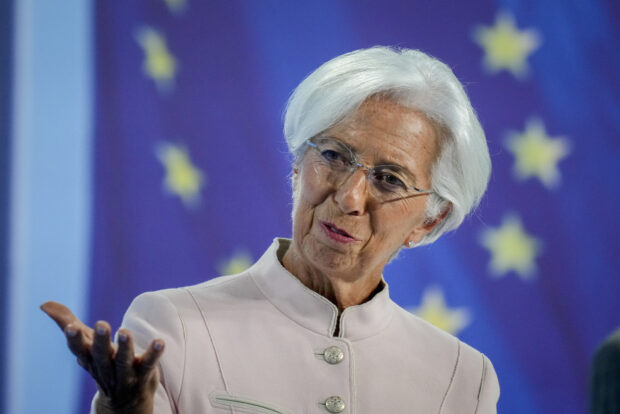European Central Bank keeps key interest rate at record high

President of European Central Bank Christine Lagarde speaks at the press conference in Frankfurt, Germany, Thursday, Sept. 14, 2023. The European Central Bank kept its key interest rate at a record high Thursday, and said it will leave it there as long as needed to battle back inflation, signaling that cuts are not around the corner despite expectations it will act next year to support the shrinking economy. (AP Photo/Michael Probst, file)
FRANKFURT, Germany — The European Central Bank kept its key interest rate at a record high Thursday and said it will leave it there as long as needed to battle back inflation, signaling that cuts are not around the corner despite expectations it will act next year to support the shrinking economy.
It follows similar decisions this week by the U.S. Federal Reserve, Bank of England and Swiss National Bank to leave rates unchanged. The Fed went further by signaling it could make three interest rate cuts next year.
The ECB gave away little about its future moves after keeping its benchmark rate at 4 percent, reiterating that it will make decisions based on the latest information on how the economy is doing.
READ: Euro zone inflation tumbles, pitting ECB against markets
“Should we lower our guard? We ask ourselves that question. No, we should absolutely not lower our guard,” bank President Christine Lagarde said at a news conference, speaking hoarsely and coughing at times because she said she was recovering from COVID-19 but was no longer contagious.
Policymakers “did not discuss rate cuts at all, no discussion, no debate on this issue,” she said. Lagarde also stressed that future decisions will ensure that rates “will be set at sufficiently restrictive levels for as long as necessary.”
Central banks worldwide drastically raised rates to contain inflation that broke out in the wake of the COVID-19 pandemic and Russia’s invasion of Ukraine. They’re now trying to balance keeping rates high for long enough to ensure inflation is contained against the risk that higher borrowing costs could throw their economies into recession.
Inflation has fallen more than expected in the 20 European Union countries that use the euro currency, to 2.4 percent in November from a peak of 10.6 percent in October 2022. That’s not too far from the ECB’s goal of 2% considered best for the economy.
That has led analysts to predict the ECB will cut rates next year, though the timing is not certain and forecasts range from March to September for the move.
READ: ECB’s Schnabel scraps more rate hikes after ‘remarkable’ inflation drop
While inflation is down following a record pace of rate hikes, economic growth has lagged because the cost of borrowing has surged for things like home purchases and business investment in new offices and factory equipment. The eurozone saw economic output shrink 0.1 percent in the July-to-September quarter.
Meanwhile, wages are still catching up to higher prices in shops, leaving European consumers less than euphoric even as European city centers deck themselves in Christmas lights.
In Paris, travel agent Amel Zemani says Christmas shopping will have to wait for the post-holiday sales.
“I can’t go shopping this year, I can’t afford Christmas gifts for the kids,” she said. “What do they want? They want sneakers. I’m waiting for the sales to give them the gifts then. And they understand.”
Steven Ekerovich, an American photographer living in the French capital, said that while “Paris was lagging easily 50% behind the rest of the major cosmopolitan cities in pricing, it’s catching up fast. Rents, food, clothing. So, you have got to be careful now.”
That lingering inflation being felt across the eurozone is what the ECB is trying to stamp out.
The bank’s messaging Thursday showed that “there’s still a long way to go before the ECB starts cutting rates,” said Carsten Brzeski, chief eurozone economist at ING bank. “It should also be clear that the end of a hiking cycle does not imminently lead to a cutting cycle.”
Brzeski said he sees the first rate cuts in June.
On the other hand, inflation was likely to be “quite a lot lower” than the ECB expects, so the first cut of a quarter-percentage point could come in April, with four more such cuts more to follow, said Andrew Kenningham, chief Europe economist at Capital Economics.
Higher interest rates combat inflation by increasing the cost of borrowing throughout the economy, from bank loans and lines of credit for businesses to mortgages and credit cards. That makes it more expensive to borrow to buy things or invest, lowering demand for goods and easing prices.